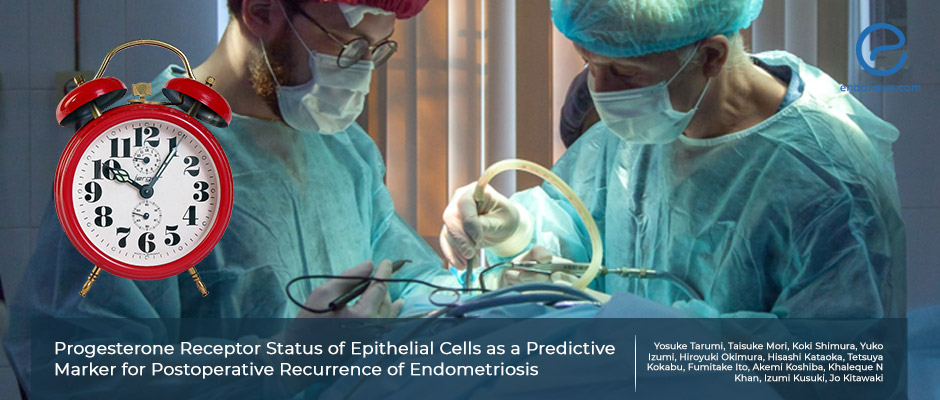A novel contribution to patient management in endometriosis by immunohistochemistry
May 19, 2022
Low progesterone receptor expression levels in epithelial component of ovarian endometriosis correlates with higher recurrence rate
Key Points
Highlights:
- Progesterone resistance including progesterone receptor deficiency is believed to be an important factor in endometriosis development and progression.
- These factors could also be effective in endometriosis recurrence following surgical resections.
Importance:
- Recurrent disease following endometriosis surgery is very important, decreases the quality of life, increases pain, and causes a decreased ovarian reserve with a failure risk.
What’s done here:
- This is a retrospective cohort study in a group of surgically operated 132 ovarian endometriosis patients investigating the association between histopathological progesterone receptor expression levels and endometriosis recurrence.
Key results:
- Low levels of progesterone receptor expression in the epithelial component of ovarian endometriosis may be a predictive factor in recurrences.
- It is plausible that histopathologic progesterone receptor evaluations could yield valuable information for postoperative management and follow-up.
Possible limitations of the study:
- Ovarian cysts other than endometriosis could also be included in the recurrence group since histopathologic confirmation of endometriosis recurrence was not made histopathologically.
- From a semantic point of view, progesterone-A and progesterone-B were not evaluated separately and only the total expression levels were assessed in this study.
Lay Summary
Dr. Tarumi and associates from the Kyoto Prefectural University of Medicine, Kyoto, Japan published their retrospective cohort study on the importance of progesterone receptors on recurring ovarian endometriosis in "The Journal of Clinical Endocrinology & Metabolism".
Surgery for endometriosis is applied to a great number of patients and the postoperative recurrence rate of endometriosis is estimated to be from 21.5% up to 56.7% within 2 years of surgery. Unfortunately, recurrence following endometriosis surgery decreases the quality of life and increases pain besides the loss of ovarian reserve with ovarian failure risk. Progesterone resistance including progesterone receptor deficiency is important in the pathophysiology of endometriosis. It is possible that these could also be important in endometriosis recurrence following surgical resections.
The authors made a retrospective cohort study investigating the association between histopathological progesterone receptor expression levels in resected ovarian endometriosis and endometriosis recurrence. The associations between the role of progesterone receptor levels and several factors for recurrence were also sought.
The progesterone receptor staining in surgical ovarian endometriosis tissues from 132 patients was evaluated histopathologically on the paraffin-embedded sections from the operation material.
More than one-fourth of the patients were reported to have a recurrence and others did not. Progesterone receptor immunostaining in the epithelial cells was statistically significantly lower in the recurrent group than in the nonrecurrent group. Statistical analysis revealed that the progesterone receptor immunostaining was an independent factor leading to a significant association for recurrence. As far as low levels of progesterone receptor expression in epithelial cells of ovarian endometriosis may be a predictive factor in recurrences, it is plausible that histopathologic progesterone receptor evaluations could yield valuable information for the postoperative management of endometriosis patients.
This is a pioneering study reporting low progesterone expression levels in ovarian endometriosis epithelial cells that may well predict the recurrence of endometriosis.
However, there are potentially effective limitations that exist in this study. Ovarian cysts other than endometriosis may exist in the recurrence group since histopathologic confirmation of endometriosis recurrence was not made by second-look laparoscopy. Another point of academic interest is that the absence of a detailed and separate evaluation of progesterone-A and progesterone- B.
Research Source: https://pubmed.ncbi.nlm.nih.gov/35235655/
endometriosis recurrence progesterone receptor histopathology immunohistochemistry

